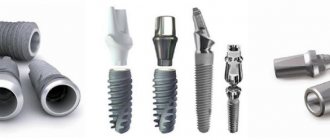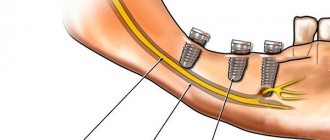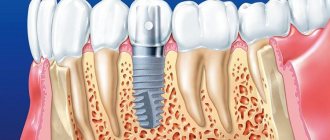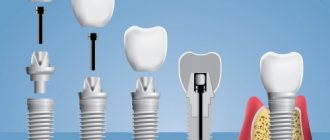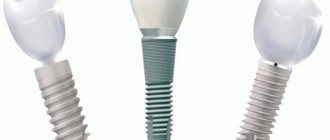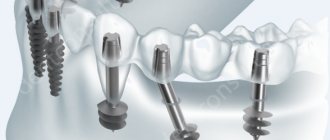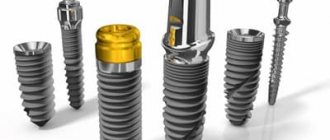Helmut Knigel, located in Germany, specializes in the production and sale of products related to the military and space industries. One of the areas of her activity is also medicine. About five years ago, this manufacturer introduced a new brand in the field of dental implantation to the market - IMPRO implants (IMPRO implants) and in a short period of time this product became one of the most popular in the dental market.
Restoring teeth and replacing them with new ones is a rather complex surgical operation; it requires a great deal of experience and skill from the doctor, because if the implant is installed incorrectly, neighboring teeth and the entire body as a whole can be damaged.
IMPRO implants greatly facilitate the surgeon’s work and have a number of positive features.
Overview of the IMPRO brand ("IMPRO") - model range, scope and service life
Article navigation
- About the manufacturer
- Features of implants
- Types of implants
- IMPLANTEM range
- MINI model range
- Advantages
- Flaws
- Differences from other implants
- Life time
- Patient reviews
- Price
Question for a specialist
IMPRO implants (“IMPRO”) are a new product from the German company Helmut Klingel. In the short period of existence on the market, many dentists and patients have managed to appreciate the highest quality of the products. Implants are characterized by excellent primary stability, high rate of engraftment in bone tissue, ease of installation, as well as wide possibilities for treatment due to the availability of a diverse product line. Despite the high quality, IMPRO designs have a very reasonable price tag. In addition, the manufacturing company guarantees that with high-quality installation and careful treatment on the part of the patient, the implants will last until the end of life.
A few words about implants
An implant is a screw made of medical titanium that is implanted into the jawbone. After successful engraftment, an abutment is installed on it, serving as an intermediate part of the prosthesis. A crown or bridge is placed on the abutment. This sequence remains unchanged, but in the process of preparing the patient and carrying out treatment it has purely individual stages and moments. All of them are determined during the planning and preparation process for the operation. Implantation is essentially a strip operation followed by implantation of an artificial titanium root, so significant attention and time is paid to a comprehensive examination of the patient, discussion of contraindications and risks, as well as preliminary treatment of even those organs and systems that are not related to the oral cavity. Of particular importance is the quality of the bone tissue at the site of the operation. If a tooth has been missing for several years, it softens and resolves. In order for the implant to take root, in such cases preliminary restoration of the bone tissue is carried out. This procedure is called a sinus lift and, if necessary, is performed before implantation.
What is known about the manufacturer
Klingel GmbH was founded in Germany in 1986, and over the years its products have received many positive reviews from implantologists in the dental field (in particular, IMPRO implantation systems and surgical instruments). Bone plates and spinal implants are also popular among orthopedists and traumatologists. High-precision pacemakers have also become widespread.
The manufacturer cooperates with many medical companies (as well as with the defense industry and aerospace companies), develops innovations and successfully applies them in their work. Klingel GmbH occupies a leading position in Europe in the field of mechanical processing of various materials, so IMPRO implants are quite reliable and do not break. Although, compared to other products of this company, they are not very popular.
Kinds
- Impro systems with hexagonal microfleet. They have a shortened neck to fill the gap between the prosthesis and the root zone. They are used for dentures of anterior teeth and premolars.
- Double-entry implants for incisors and molars. They are characterized by increased reliability of fixation.
- Mini prosthesis Impro. They are used for serious problems with bite, extensive damage, and poor tissue condition.
- Implants for transgingival or sutureless dentures. They are characterized by greater volume and a smooth surface of the neck.
Features of IMPRO implants and what the models look like
- the use of highly purified grade 4 titanium: it is a completely biocompatible metal that does not provoke allergies and does not interfere with the rapid growth of young bone on the surface of the implant,
- special SuperH surface: obtained by anodizing the implant in an electrolyte solution (acid). As a result, the coating ceases to be smooth, but becomes rough, covered with micropores - which greatly increases the useful area for the attachment of a large number of bone building cells (osteoblasts),
- root-shaped: identical to the natural root, which allows implants to be placed with minimal drilling of bone tissue and does not allow them to fall into the depths of porous bone (3-4 types),
- The implants are equipped with double self-tapping threads, as well as triple and quadruple threads in the neck area, which allows them to be installed both in a pre-prepared bed and in the socket of a newly extracted tooth. The threading on the neck and near the apex becomes less aggressive than in the center - so that the implant is installed with optimal pressure without trauma to the bone. This ensures excellent primary stability and preservation of the marginal bone[1] due to the correct distribution of the chewing load,
- universal and wide range of orthopedic components: for any implant from IMPRO you can select several abutments. There are abutments for screw and cement fixation, titanium, cobalt-chrome or from the strongest alloy of titanium with aluminum and vanadium, as well as multi-unit angular abutments (anodized). There are abutments with a ball-shaped tip for conditionally removable dentures and magnetic abutments. The manufacturer can make individual abutments individually for the patient based on impressions of the oral cavity,
- simple and convenient surgical protocols,
- Lifetime warranty from the manufacturer on all system elements.
Technical characteristics of Impro dental implants:
- form
. The conical configuration of the neck/body of the implant (analogous to the anatomy of a living root) ensures 100% immobility and allows for the insertion of a rod with minimal risk of injury; - multifunctional threaded connections
. They guarantee ease of use and ease of installation. The universal design is tightly fixed in the tooth socket after removal of the dental unit, allowing for prosthetics with immediate loading; - abutments
. Large range of fastenings for fixing. Titanium models have an oxide film on the surface, which creates good aesthetics and reduces wear; - surface
. For processing, a unique SuperH technique is used, which gives the surface a porous structure reminiscent of bone tissue. Thanks to this coating, osseointegration occurs quickly and painlessly, and oxidation processes slow down.
In the manufacture of the German Impro system, a titanium alloy is used that does not cause allergic reactions or rejection. 25 years of experience, multi-stage sterility/quality testing allows Helmut Knigel to provide a lifetime guarantee on installed structures.
Types of IMPRO implants – universal products from Germany
- implants for classical implantation,
- implants for installation in the socket of a newly extracted tooth,
- implants for immediate loading - are installed transgingivally, that is, using a gentle method, without massive incisions and drilling of the implant bed in the bone tissue. But mainly for single restorations,
- mini implants.
In general, the range of IMPRO implants is represented by more than 50 models, varying in shape and size, which allows the doctor to choose the option that is ideal for a particular patient.
IMPLANTEM range
IMPLANTEM (not to be confused with the Implantium brand) are classic root-like systems with a SuperH surface, a slightly inclined and polished neck shoulder (so that plaque does not accumulate in this area and infection does not develop). The IMPLANTEM model also has an internal conical connection and an anti-rotation hexagon for fixing the abutment. This ensures error-free installation of the abutment in only one correct position, as well as very tight contact between the implant and the abutment (approximately 1 µm).
The tip (or apex) of the implant is flat, which is favorable for careful installation - there is no risk of damage to the nerves or membranes of the maxillary sinuses. But only on condition that the implantologist competently planned the surgical stage and was guided by computed tomography, as well as special software.
Among the features of IMPLANTEM is the principle of “platform switching”. When the external relief of the area of connection of the implant with the abutment promotes the formation of a ring of connective tissue fibers, preventing the destruction of the uppermost part of the bone and preserving the gum level. These systems are installed below the bone level. The diameter of IMPLANTEM implants varies from 3.6 to 7 mm, and the length from 7.2 to 14 mm.
MINI model range
These are one-piece mini-implants with a smooth neck, aggressive carving, and SuperH surface. Models from the MINI line are not recommended for permanent prosthetics, as they will not last long and will lose their fixation within 2-3 years. The only exception is the obvious limitation of bone size in the absence of lower incisors. In all other cases, MINIs are used as temporary supports, in particular to support a removable denture while classic implants take root. The diameter of the models varies between 2-3.5 mm, the length ranges from 6 to 14 mm.
Types of implants
The German company has developed several types of implants, each of which has its own characteristics and indications for installation.
- Transgingival. The neck of the system has special longitudinal gaps and volumetric dimensions, which allows for excellent stabilization even under high chewing loads. It is used for implantation into the area of chewing teeth: molars, premolars. The implant is introduced using a puncture, which minimizes the risk of soft tissue injury.
- Mini implants. They are small in size and have a short neck. Thanks to this, they can be implanted when there is insufficient bone tissue, and an abutment with a crown can be immediately installed on the system.
- Submersible with micro thread. The diameter is 3.6–7.0 mm. Thanks to the shortened neck, there is no gap between the crown and the metal base. This type is suitable for restoration of the anterior row of teeth and premolars.
- Double thread implants. The thread of such designs has a unique structure. This makes it possible to implant products in difficult cases, for example, with insufficiency of bone tissue. Installation is carried out both in the molar area and on the front teeth.
Advantages of IMPRO implants
- quite fast engraftment time: due to special surface treatment (three-dimensional etching), implants have excellent engraftment characteristics in the bone, due to which prosthetics on the lower jaw are possible after two months, on the upper - after three,
- according to the manufacturer, bone tissue augmentation and sinus lifting are not required (or they are carried out simultaneously with implantation): this is possible thanks to the choice of special structures for instant loading, ideally suited in length and thickness to the original dimensions of the patient’s bone tissue,
- implants can withstand loads of up to 100 kg (even the thinnest ones): thanks to which the patient does not have to give up his usual way of eating,
- high aesthetics due to the use of abutments (tops of implants that are used to fix crowns) with aesthetic coating.
Indications and contraindications for implantation
Indications for surgery are pathologies :
- loss of one or more teeth;
- edentia (complete absence of one or two rows of teeth);
- impossibility of prosthetics;
- thinning or destruction of bone;
- small height of the jaw at which implantation will be performed;
- patient's wishes.
Implantation cannot be performed in cases:
- periodontal disease;
- inflammation of the tissues around the tooth;
- neuropsychiatric disorders (bruxism, schizophrenia, etc.);
- acute liver and kidney diseases, exacerbation of chronic diseases;
- osteoporosis;
- pathology of the cardiovascular system;
- alcoholism, drug addiction;
- pregnancy;
- decompensated form of diabetes mellitus.
Disadvantages of IMPRO implants
The negative aspects of IMPRO implants from Germany include the following. For example, the surface does not contain structures that accelerate osseointegration: for example, brands such as Nobel Biocare or Astra Tech enrich the coating with phosphorus, hydroxyl groups, fluorine, and Straumann produces implants with nanostructures. Therefore, IMPRO systems are still not recommended by dentists for immediate or early loading, although the manufacturer considers such options possible.
In addition, there is a certain “poverty” in the form of the models (they are all almost identical), which imposes certain restrictions on solving certain clinical situations. That is, these are basic models that are actually better to install under ideal conditions.
Alternative options
If for any reason Impro dentures are not suitable for a patient, it is worth considering immediate alternatives. Medicine is very well developed in Germany - implantology is no exception. Products from many German competitors such as ICX, Ankylos, Semados, Real Implants and XiVE offer almost the same price/quality ratio as Helmut Knigel products.
Swiss implants from Noble Biocare, Osstem, Astra Tech, Mis and Swiss Straumann and U-Impl (known in Russia as Wimple) also work well, but are a little more expensive. If a person cannot afford premium products or does not need them (without clinical complications or aesthetic requirements), many national and Israeli companies work for its French production and are also very popular in Russia.
Differences between IMPRO implants and other brands
There are several distinctive features of implantation products. For example, implants are not sandblasted, which is often used by other brands to create roughness. According to experts, this helps to avoid contamination of the surface with particles of aluminum, which is used for such processing.
Another difference from the bulk of manufacturers in the middle price segment is that IMPRO uses only highly purified titanium for implants, and not its cheaper alloys. It is also impossible not to note once again the versatility of the orthopedic components, which are suitable for many other brands.
Preparing for surgery
Since implantation is a surgical procedure, it requires careful preparation, which consists of the following steps:
- Anamnesis collection. Using a survey, the dentist finds out the patient’s complaints, the presence of dental and other diseases.
- Examination of the body. Based on a general analysis of blood and urine, the therapist makes a conclusion about the presence of diseases in the patient that may act as contraindications to the operation.
- Examination of the oral cavity. Using radiography, computed tomography and other instrumental examination techniques, the condition of the tissues of the oral cavity, teeth, and joints is studied.
- Sanitation. If any diseases of the oral cavity are detected, they are treated and the teeth are professionally cleaned to remove plaque and tartar.
If there are no contraindications to implantation, the specialist draws up a plan for the operation: determines the required shape and length of the model, location of placement, and decides on the need to perform bone grafting.
IMPRO service life
How long will IMPRO systems last? According to the manufacturer, the warranty on original implants is unlimited, but only if the patient follows all the recommendations of the attending implantologist for care and use.
Read on the topic: features of nutrition and lifestyle after implantation - recommendations from practicing implantologists.
And to know for sure that the doctor installed the original implants, carefully review your contract with the clinic and the patient’s service book. All barcodes from implant packaging are attached there - these codes can be checked with the manufacturer. By the way, the packaging is sterile with a high degree of protection. And before being released for sale, all products undergo 5 levels of control.
Design features
In the production of Impro implants, the latest technological developments are used, thanks to which the catalog models have the following structural features:
- conical shape , providing a high degree of primary stabilization in bone tissue;
- quad thread with four separate turns on the neck of the implant, and double self-tapping aggressive thread on the body of the screw;
- internal connection in the form of a cone with an anti-rotation hexagon;
- treatment of the implant surface using three-dimensional etching to ensure resemblance to bone tissue;
- switching product platforms;
- single orthopedic platform for all implant sizes.
For the production of Impro implants, high-strength titanium alloy Grade 4 is used, which has high biological compatibility with the bone structures of the jaw arch.
The video provides additional information about the features of the system elements.
Patient reviews of the IMPRO brand
“My crown came off and the tooth had to be removed. I didn’t want a bridge, so I was looking for somewhere to get implants cheaply and cheerfully. I had to go to the region and found a dentist on Instagram. And there at the clinic they came under the all-inclusive promotion, for 30 thousand they made a new tooth on an Impro implant and the neighboring ones did not have to be covered with crowns.”
Marina, review from the forum stomatology.rf
“To be honest, at first I was also surprised by the price of Impro. I thought that a new tooth would cost at least fifty dollars, but here they offered me 35, and even German implants. I looked at the reviews, they don’t seem to write anything bad. Well, I agreed. Made the bottom five and six. Of course, I had to go without teeth for several months; the doctor said that I couldn’t chew yet. Well, if it’s necessary, then it’s necessary. I didn’t chew on this side and that’s it, although sometimes I forgot. But everything settled down fine.”
ValeroN, review from otzovik.com
Stages of the procedure
Depending on the clinical situation, dental implantation using Impro systems can be carried out in one or two stages.
In both cases, surgical intervention consists of the following stages:
- Administration of anesthetic and treatment of gum tissue.
- Incision of the gum and formation of the bone bed. In some cases, the operation can be performed by puncturing soft tissue.
- Implant insertion. In a one-stage procedure, an abutment or crown is immediately fixed to the artificial root. The classic method of performing the operation involves closing the implant with a plug, returning the detached flaps of gum tissue to their original place and fixing them with suture material.
- Abutment fixation. After complete engraftment of the titanium rod, the plug is removed and an abutment is placed in its place, around which soft tissue will form, closing the gap between the system and the crown.
- Crown installation. This stage is the final one and is carried out after the final engraftment of the system and the formation of the required volume of gum tissue around it.
The video shows the process of installing an implant on a model.
Cost of IMPRO implants
Despite the fact that IMPRO implants are created in Germany, unlike similar German designs, they are distinguished by their affordable prices. At the same time, they have the characteristics of premium products. In terms of price, they belong to the middle price segment and are at the same level as the cost of Israeli implants.
At the same time, the low price does not affect the quality at all: in a short period of existence, both on the European and Russian markets, IMPRO implants have proven themselves to be reliable, high-quality, quickly fused with the bone and allowing you to move on to prosthetics in just 2-3 months even after installing classic two-stage structures.
[1] Matveeva A.I., Frolov V.A., Gvetadze R.Sh., Borisov A.G., Kushkhabiev 3.3. The influence of implant parameters on the stress-strain state of bone tissue in the implantation zone // Dentistry. - 2010. - No. 1. - P. 54-55
How Impro differs from other systems
| Parameter for comparison | Impro | AnyOne | Xive | Osstem |
| Manufacturer country | Germany | South Korea | Germany | South Korea |
| Class | Business | Business | Business | Business |
| Metal for making | Titanium | Titanium | Titanium | Titanium |
| Biocompatibility | + | + | + | + |
| Engraftment time | 2-3 months | 2-3 months | 2-3 months | 1.5-2 months |
| Immediate load | + | + | + | + |
| Express implantation after tooth extraction | + | + | + | + |
| Manufacturer's warranty | For life | from 10 years | from 10 years | For life |
| Installation price (implant + surgery) | 35000 | 32000 | 33000 | 35000 |
